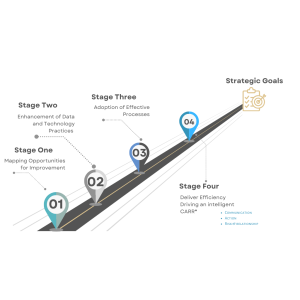Your roadmap to Business Transformation
Hitting the road? Whether you’re behind the wheel of a car or an organisation, there’s a lot to get right. Understanding your location, your destination and which direction you’re headed is when you will need a map. Read on how to use your roadmap for business transformation!
With our operational excellence roadmap, we’ll plot your organisation’s opportunities to improve. Enhance its data. And help your team adopt more effective processes.
But what is this operational excellence roadmap? And how do we, here at DELTA Informed Decisions, use it to help your business drive smoothly and safely?
Below, we talk you through the model’s four key stages – and what they mean for your organisation’s data transformation journey.
but first: What is operational excellence?
Organisations come to us looking for digital, data-driven transformation: a shift to a more dynamic, lean culture.
But often, they don’t have a strong purpose for that transformation. They lack the ‘why’.
Operational excellence is that ‘why’.
It’s both the journey and the destination; the meaning and the metric. It’s how we approach, evaluate and measure the effectiveness of our efforts, and build the foundations of sustainable organisational success.
It’s the start of a road towards something purposeful and meaningful for your organisation – whatever you want that to be.
The four stages of your roadmap to Business Transformation
So now, let’s unfold the map.
We’ve developed our operational excellence roadmap to plot your organisation’s transformative course. It has four stages:
- Mapping opportunities to improve
- Enhancing your data and technology practices
- Adopting effective processes
- Driving an intelligent CARR
We’ll unpack each of these stages below. But before we begin guiding your organisation with this roadmap, we need to know your end goals.
Setting the stage: Understanding your strategic goals
Our operational excellence roadmap to business transformation isn’t just for show. It doesn’t exist merely to prove to your stakeholders and superiors that you’re ‘doing something’. (Or to collect dust in an old ring binder.) Rather, it’s designed to solve problems – such as data siloing and poor communication – with practical, intelligent solutions. It’s here to help your organisation fulfil its goals. But to do that, we first need to understand what those goals are.
Do you want to develop clearer pictures of your business’s risks? To offer proof of your approach, or justify external funding? To get better at capturing data – then using it to evolve your organisation? Whatever your business’s priorities are, we’ll work with you to articulate them. Once that’s done, we start at the beginning.
STAGE 1: MAPPING OPPORTUNITIES TO IMPROVE
Here at DELTA Informed Decisions, we don’t look for problems. We look for opportunities. We search not for what your organisation lacks – but where it can improve.
These opportunities tend to vary. But usually, it’s down to a lack of a system. To inefficiencies in capturing and using data constructively. It’s a failure to engage with the systems, understand the information they provide – then apply that to drive progress.
Well, we’re here to point out opportunities to develop – not point the finger. And we see these not as problems. But as platforms for progress.
STAGE 2: ENHANCING YOUR DATA AND TECHNOLOGY PRACTICES
Once we’ve understood your organisation’s objectives and opportunities, it’s time to get specific. To harness a data strategy or model. And turn that wider context into a tangible plan for business transformation.
Our role? To assess your existing data practices, and evaluate how you’re using technology. After that, we’ll collaborate with you on a better way to collect and analyse data. This could involve introducing a new system, or simply tweaking the one you use now to be more effective. For instance, if your current data practices lean heavily on tools such as Microsoft Excel, they’re prone to human error. A missing letter here; an extra zero there.
One slip of the space bar can badly skew the data. Or worse – render it unusable. We work with you to improve your business’s relationship with its data. To harness machine-friendly technology practices palatable to algorithms and analytical models alike.
The result? Meaningful, actionable insights. Leading to better processes – and more dynamic decision-making.
Stage 3: ADOPTING EFFECTIVE PROCESSES
Once you’ve understood the data (the fruits of stage two’s labours), your organisation can now adopt more effective processes.
After all, data and processes have hinges; they work together to help you open and close important doors. By leveraging one, you improve the efficiency of the other. So, once we have a handle on your organisation’s top opportunities to improve – and the role the data plays here – we can address them.
To return to our roadmap analogy, your organisation’s processes are like the car you’re travelling in. It may be functioning – but it could be functioning better. (And what are those grinding, clunking, scraping sounds coming from the engine? Why are we stopping?)
When we adopt more effective processes, we funnel more oil into the car. Suddenly, it just sounds better. It’s running smoothly; its moving parts free to continue their delicate, dynamic dance.
Stage 4: DRIVING AN INTELLIGENT CARR
With better data and processes propelling your business onward, it’s time to consolidate that progress; to turn that data into a common business language.
An organisation is like an orchestra. Everyone performs together, in harmony. But if one can’t read the notes, well… what’s going to happen?
Our CARR model helps keep your musicians singing from the same song sheet.
- Communication is key. It’s about ensuring everyone within your organisation – through clear, simple and direct communication channels – is on board with your data and processes.
- Action means conveying not only the data, but what you want your audience to do with it. Raw data doesn’t tell a story. You need to frame it within the wider narrative of operational excellence to encourage action and engagement.
- Risk involves understanding where the pitfalls lie, and harnessing the data to avoid them. To ensure the data tells a story; to translate it into a relevant, relatable risk language. And, through this, mitigate against threats to your organisation.
- Relationship is about ensuring everyone is in the loop. It’s being able to demonstrate value to key stakeholders, and align your approach with their expectations. (However varied those may be!)
The operational excellence circuit: your unique journey
This roadmap provides a formula for operational excellence to truly transform your business. But how we apply it to your organisation is tailored entirely to your needs and strategic goals.
And no two journeys look the same.
What’s more, while the stages of the roadmap stay the same, their order doesn’t have to. Sometimes, we may start with stage two – enhancing your data practices – or even at stage three, with the processes. Often, we may work backwards through the stages, or jump between them. It’s less linear, more malleable – and it all depends on what’s best for your business.
Through this lens, the operational excellence model is as much a roadmap as a circuit. It’s cyclical; a perennial, perpetual process of evaluation, optimisation, and iteration. (And patience!)
Prepared by us. Polished with you. And poised to take your business to new operational heights.
Excellent ones!
If you missed out on our previous blog we recommend your next read around “Business Excellency”
Want to know more? Get in touch for a conversation about how DELTA Informed Decisions can help.
We’ll work with you to shape your tailored operational excellence roadmap. And move your business in the direction of its key strategic goals. Faster, smarter, more comfortably – and via the most direct route possible.



Recent Comments